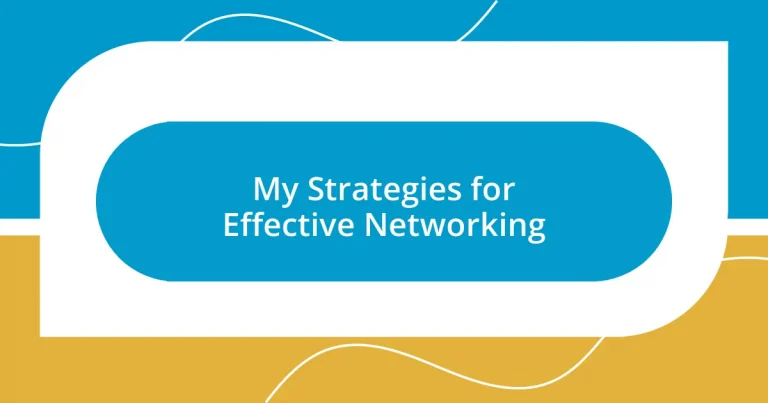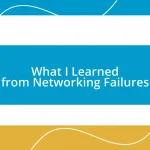Key takeaways:
- Networking enhances professional growth by building mutually beneficial relationships and expanding opportunities.
- Setting specific networking goals, such as finding a mentor or enhancing visibility, can lead to more meaningful interactions and collaborations.
- Following up after initial connections is vital for establishing lasting relationships, with personalized messages and timely outreach significantly enhancing engagement.
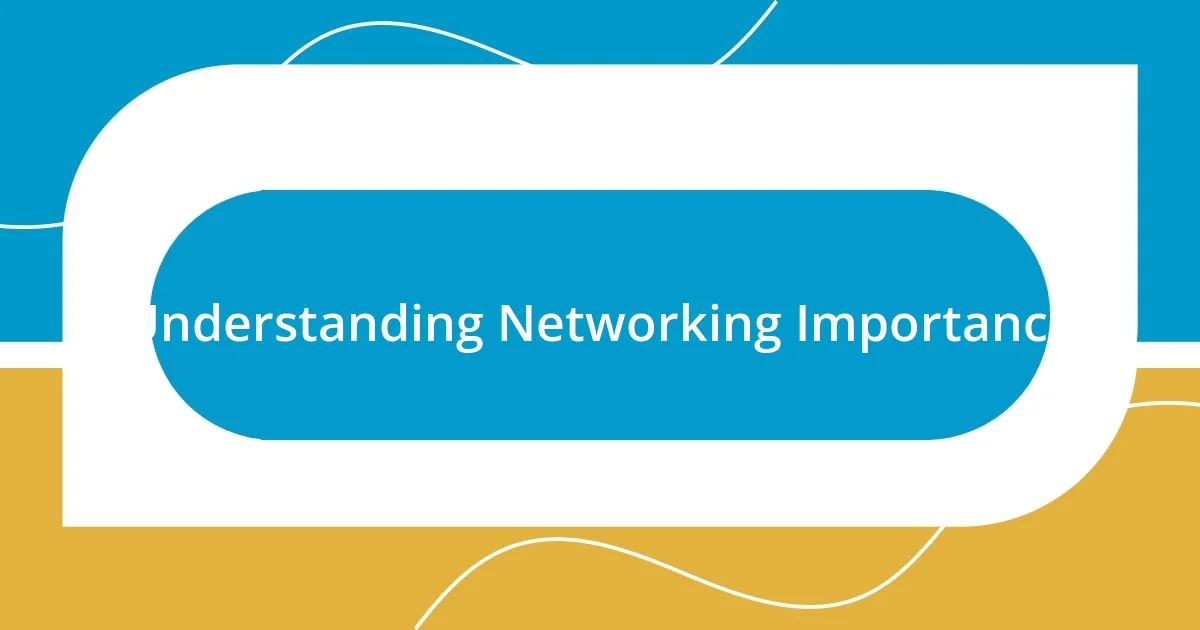
Understanding Networking Importance
Networking is a crucial aspect of both professional and personal growth, serving as the bridge that connects us to opportunities we might not find on our own. I remember attending a small industry conference, feeling a bit lost, but one meaningful conversation led me to a mentor who ultimately guided my career. Isn’t it fascinating how just one conversation can change the trajectory of your professional life?
When I consider the importance of networking, I often reflect on the idea of community. It’s about building relationships that are mutually beneficial, where support and knowledge flow back and forth. I once reached out to an old colleague for advice on a project, and not only did I gain insight, but I also re-established a valuable connection that has since opened new doors for collaboration. Who knows what potential partnerships are waiting just beyond your next introduction?
In an age where personal branding is more important than ever, networking plays a pivotal role in crafting your image and expanding your influence. Have you ever thought about how your network shapes perceptions about who you are? I’ve found that the people I surround myself with directly reflect my values and aspirations, reinforcing the idea that effective networking is not just about quantity, but quality as well.
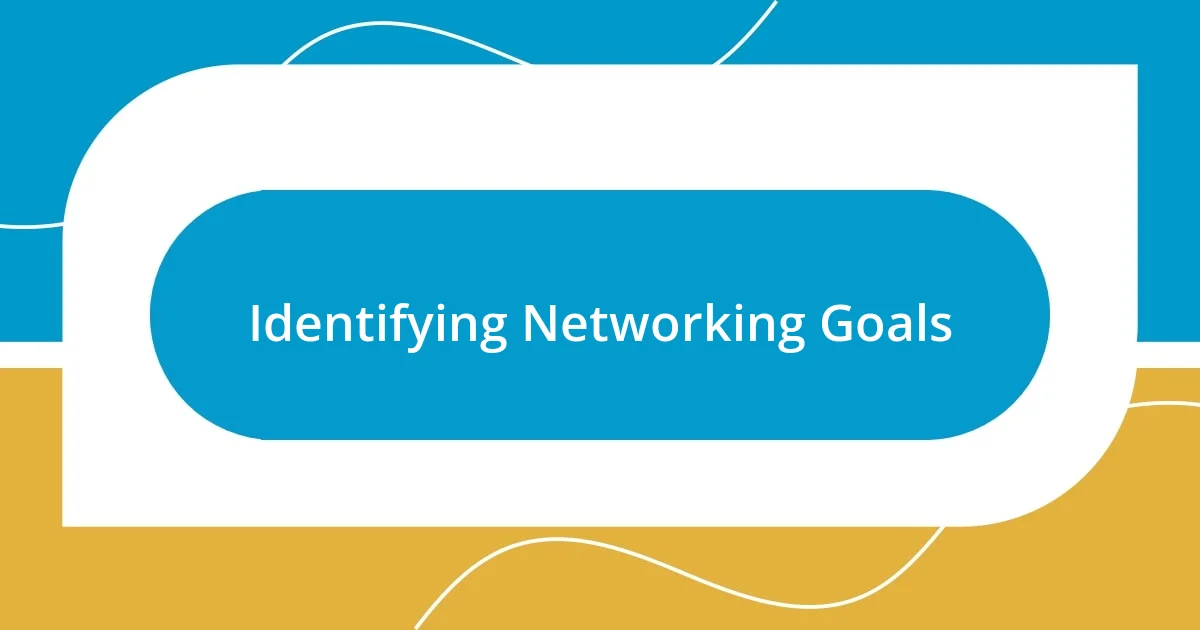
Identifying Networking Goals
Identifying your networking goals is essential to make your efforts more focused and fruitful. I often sit down and think about what I really want to achieve—whether to find a mentor, seek new clients, or simply expand my circle of like-minded professionals. This clarity helps me target my conversations and relationships more effectively. When I made the intentional choice to seek out a mentor last year, I suddenly found myself engaged in meaningful discussions that aligned with my career aspirations.
Here are a few networking goals to consider:
- Building a support network: Connect with individuals who share your interests and can offer guidance.
- Expanding your influence: Seek people who can introduce you to new opportunities or audiences.
- Learning new skills: Engage with others who can teach you something valuable or present resources you haven’t yet explored.
- Exploring collaboration: Look for peers who are interested in partnerships that could lead to innovative projects.
- Enhancing visibility: Identify opportunities to be seen—whether through speaking engagements or social media presence.
When I set a specific goal to enhance my visibility through speaking at local meetups, I was pleasantly surprised by how much it also enriched my network. Each goal I identify shapes my interactions, driving me to build relationships that matter rather than chasing after everyone I meet.
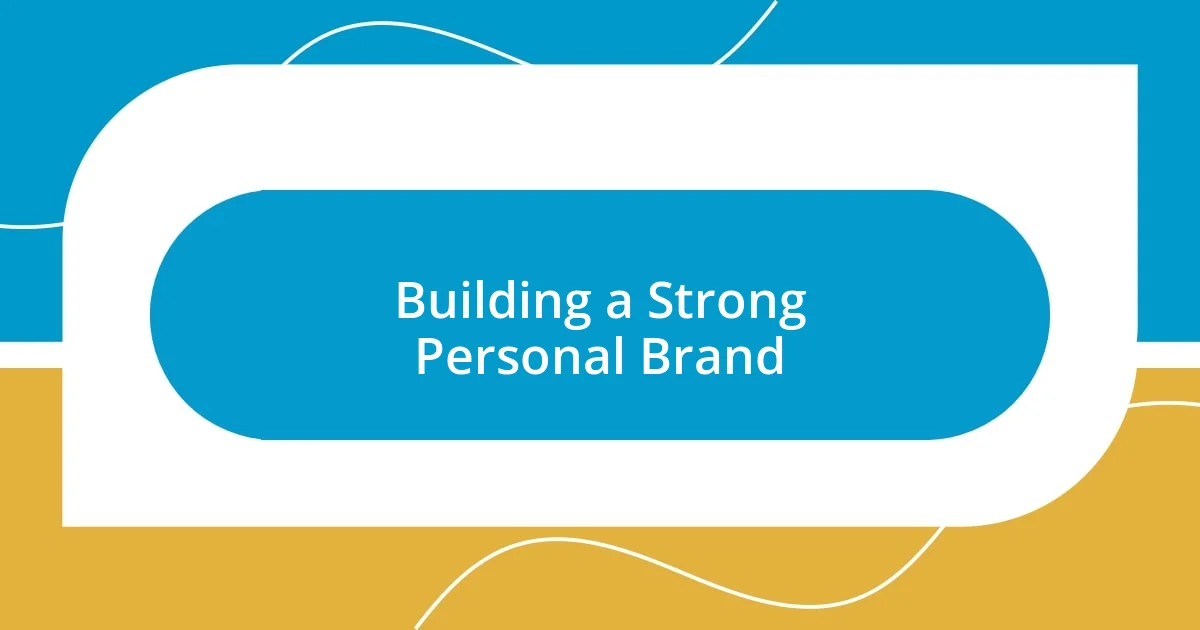
Building a Strong Personal Brand
Building a strong personal brand is essential in today’s competitive environment. I’ve noticed that the way I present myself online and offline greatly influences how others perceive me. A few years ago, I decided to curate my social media profiles to reflect my professional achievements and personal interests. This decision not only aligned my online persona with my career goals but also attracted opportunities that I didn’t initially think were possible.
Creating consistency in your messaging is also vital. I remember attending networking events where some individuals had varied approaches, leaving me confused about their expertise. When I began to align my professional interactions with a clearly defined brand, people were more likely to remember me and my purpose. I found that a unified approach makes it easier for others to refer me to opportunities that match my strengths and values.
Finally, authenticity plays a key role in building a strong personal brand. I once met a mentor who was refreshingly honest about their journey. Their realness resonated with me on a deep level and taught me the power of being genuine. When I embraced my true self in my brand, connections flourished. People appreciate authenticity; it cultivates trust and encourages deeper relationships.
| Aspect | Importance |
|---|---|
| Consistency | It helps solidify your image and makes you memorable. |
| Authenticity | Genuine connections foster trust and stronger relationships. |
| Adaptability | Adjust your brand to align with personal growth and changing goals. |

Leveraging Social Media Platforms
Social media platforms have become an incredible tool for networking. I remember when I started using LinkedIn more actively; it felt like opening a door to a world filled with opportunities. Engaging with posts, sharing insights, and commenting on industry-related topics not only helped me stay informed but also positioned me as a knowledgeable figure in my field. Have you ever experienced that rush of excitement when a connection reaches out after seeing your content? It’s that moment when your digital presence becomes tangible and meaningful.
Using platforms like Twitter for quick interactions led me to unexpected collaborations. There was a time I tweeted about a project I was working on, and surprisingly, someone in my network reached out to explore partnership ideas. This underlines how even a seemingly casual mention can attract the right attention. I believe it’s crucial to follow industry hashtags and engage in conversations that align with your goals, which can significantly widen your professional circle.
I also find that sharing authentic stories about my journey resonates deeply with my audience. Recently, I posted about a challenge I faced in my job search, and the outpouring of support and advice from my network was overwhelming. It’s moments like this that remind me: the deeper I connect with my audience, the more they feel compelled to support me and my endeavors. So, how can you leverage your social media effectively? Start by being intentional with your interactions and sharing your authentic self. You never know who might be watching and ready to connect!
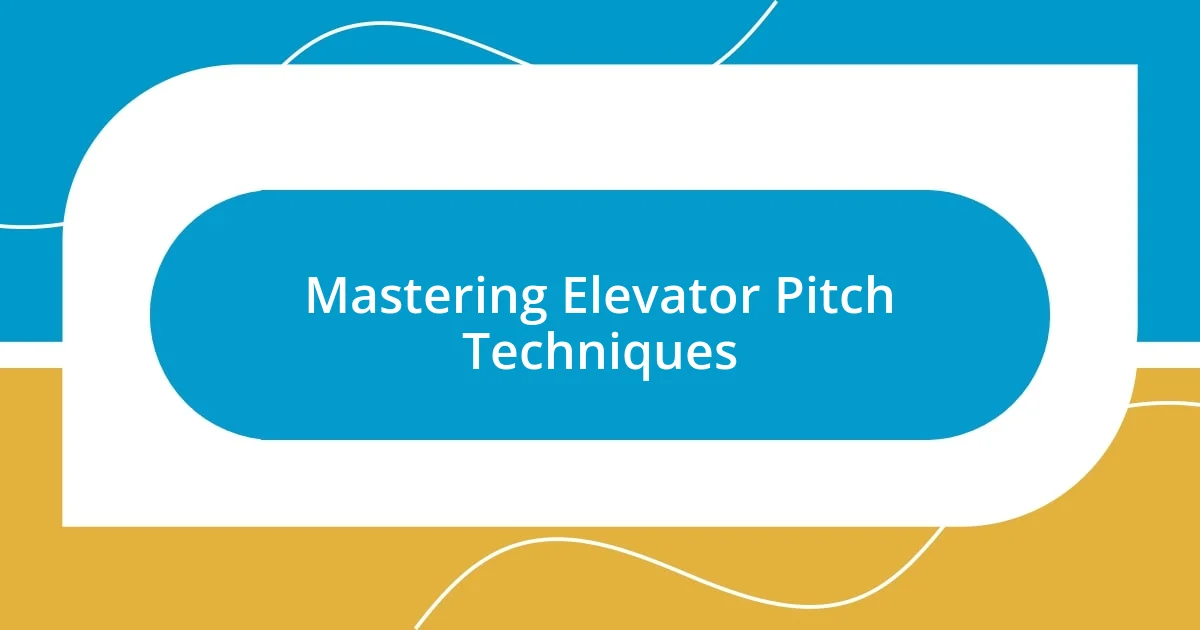
Mastering Elevator Pitch Techniques
Mastering the art of the elevator pitch can significantly impact your networking success. I remember crafting my pitch after attending a workshop—putting emphasis on clarity and brevity. The goal was to deliver a compelling message in under 30 seconds. Have you ever seen the eyes of someone glaze over when you ramble? It’s a wake-up call; engaging quickly is essential.
In my experience, personal anecdotes can elevate your pitch from mundane to memorable. Once, I shared a brief story about how I shifted my career path after a pivotal moment. The listener was not only intrigued but felt a connection to my journey. This experience reinforced my belief that authenticity infused with storytelling resonates deeply. Have you considered how your stories could spark interest?
Practicing your pitch with a friend can reveal areas for improvement. After doing this, I realized the importance of body language and tone. One day, while rehearsing, my friend pointed out my nervous gestures, which distracted from my words. These small details, while easy to overlook, can dramatically change how your message is received. So, how comfortable are you with your delivery? Tweaking those minor aspects can make all the difference, turning a simple introduction into an engaging conversation starter.
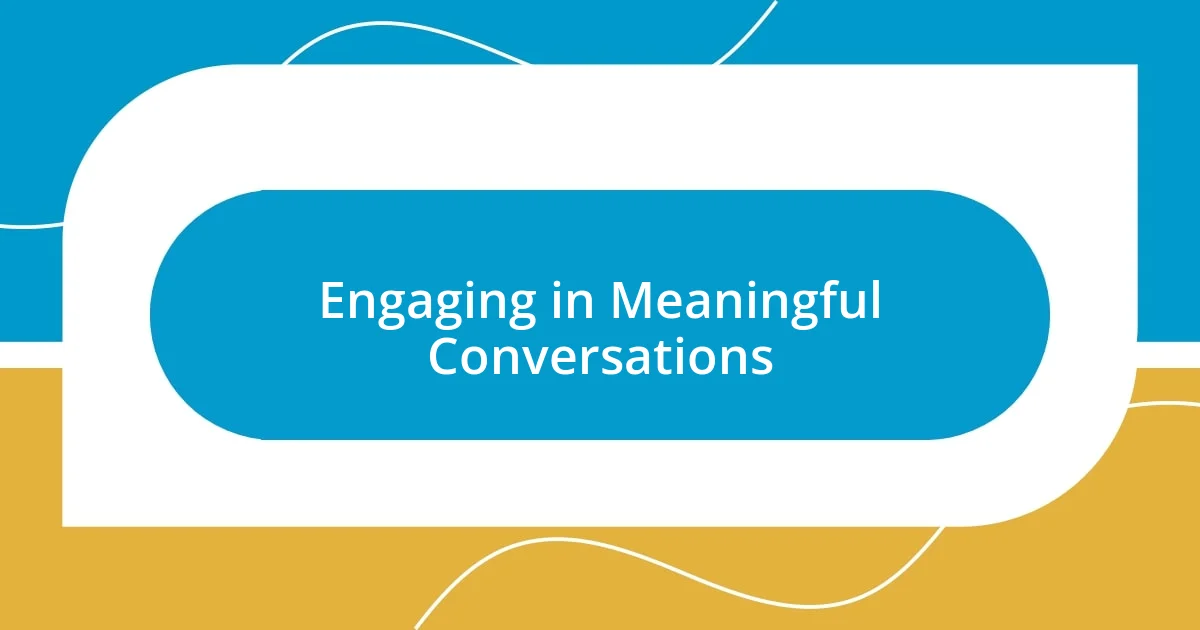
Engaging in Meaningful Conversations
Engaging in meaningful conversations starts with active listening. I’ve noticed that when I genuinely focus on what others are saying, it opens up a whole new dimension of connection. Like the time I met someone at a conference who shared a personal story about overcoming obstacles in their career. Instead of just nodding along, I asked thoughtful questions, and we ended up diving deep into a dialogue that lasted for hours. It taught me that the art of conversation thrives when we prioritize understanding over merely responding.
I’ve also found that sharing vulnerabilities can transform superficial chats into profound exchanges. Once, during a networking event, I hesitated to discuss my struggles with imposter syndrome. When I finally did, a fellow attendee revealed they felt the same way, and it sparked an authentic conversation about our shared experiences. It made me realize how exposing our weaknesses can foster a sense of camaraderie, breaking down barriers that often exist in professional settings. Have you thought about what you might reveal to build a stronger connection?
Lastly, clarifying common interests or goals can lead to invaluable opportunities. I vividly recall a situation where I stumbled upon a shared passion for environmental initiatives with someone I had just met. By delving into this mutual interest, we not only exchanged ideas but also brainstormed potential collaborations that neither of us had considered before. It reinforced my belief that meaningful conversations can pave the way for exciting possibilities—it’s about finding that spark that ignites a deeper relationship. What shared interests could you explore in your next networking encounter?
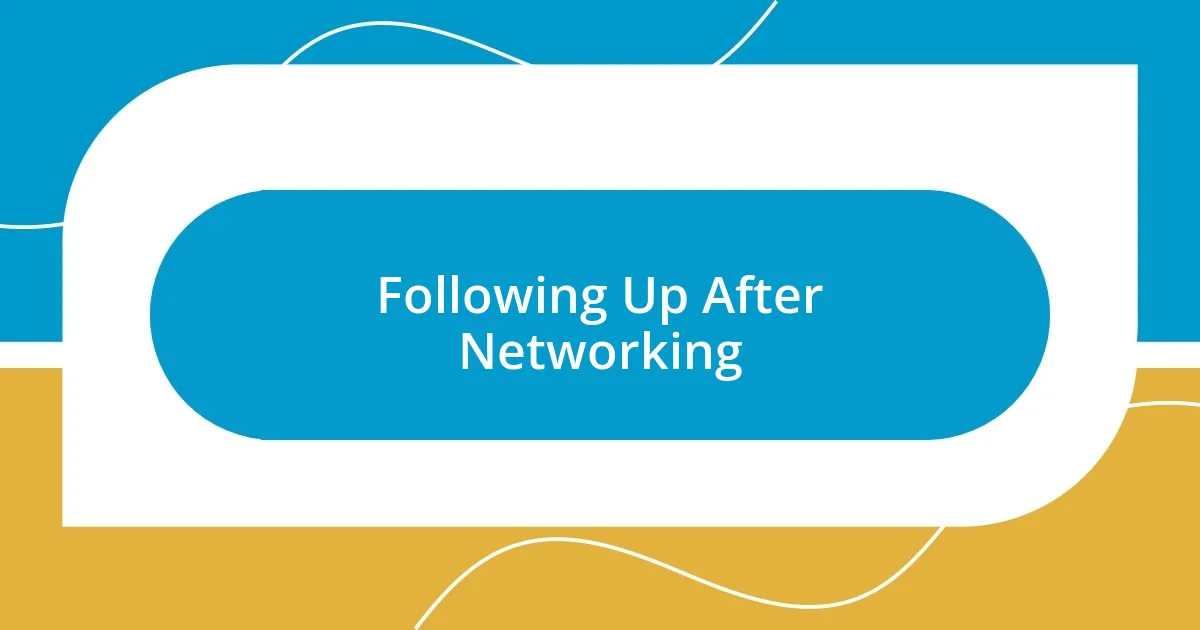
Following Up After Networking
Following up after networking is equally as crucial as the initial connection. I remember attending a workshop where I met a fascinating professional in my field. A few days later, I dropped them a quick email, referencing our conversation about industry trends. Their response not only reignited our discussion but also established a rapport that made me feel seen and valued. Have you ever noticed how a simple follow-up can transform a fleeting moment into a lasting connection?
Timing is everything when it comes to follow-ups. From my own experience, I’ve found that reaching out within a week keeps the interaction fresh in both parties’ minds. One time, I sent a LinkedIn request along with a note about a resource I thought would interest my new contact. This approach not only demonstrated my thoughtfulness but also laid the groundwork for future conversations. have you considered how the timing of your follow-ups might impact your networking relationships?
Don’t shy away from personalizing your follow-up message. In my networking ventures, I’ve learned that referencing something specific from a conversation creates a more meaningful engagement. Like the time I sent a link to an article related to a book suggestion made during a chat. That small gesture solidified my interest in their work and opened the door for further dialogue. What personal touch could you incorporate into your next follow-up?












